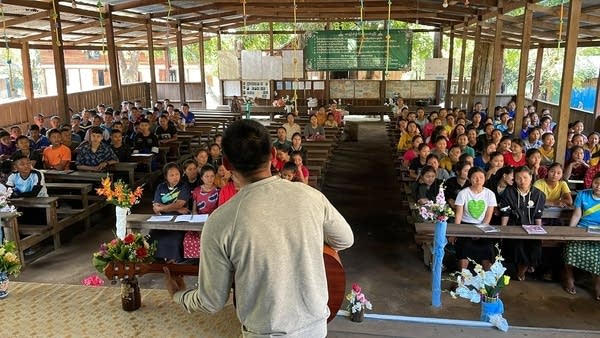MN activists return from work with Karen refugees in Myanmar region

Go Deeper.
Create an account or log in to save stories.
Like this?
Thanks for liking this story! We have added it to a list of your favorite stories.
In December, host Cathy Wurzer spoke with Minnesotans Jesse Phenow and Ku Hser, just a few days before they left for southeast Asia to help Karen refugees who are dealing with displacement and persecution after the coup that happened in Myanmar in 2021.
Minnesota is home to the largest Karen population outside of southeast Asia, and many Karen people in the Twin Cities are connected through the Urban Village in St. Paul, a nonprofit led by Phenow and Hser. They recently returned to Minnesota, and told Wurzer about their experience in the Myanmar region.
The mission of the trip was to deliver supplies to refugees and offer them solidarity and support. Hser, a videographer and photographer, also brought his equipment to document the situation and teach camera skills to local youth. His goal was to “show the world what’s happening in our area,” he said.
The trip brought Phenow and Hser close to the danger and “really serious violence” that has become more common in the region, Phenow said: “It’s one thing when you read about it, and it’s another thing when you know that it’s happening all around you.”
Turn Up Your Support
MPR News helps you turn down the noise and build shared understanding. Turn up your support for this public resource and keep trusted journalism accessible to all.
One night, airstrikes drove Phenow and Hser into hiding in the jungle with a group of high schoolers.
“To them, it’s normal life … [and] I was there to be a supporter,” Hser said, so he hid his worry and fear.

The trip stirred powerful emotions in Phenow and Hser.
“I want you to be proud because there’s so much to be proud of,” Phenow said in a message from the Myanmar region to his “little brothers” in the Karen family he shares a home with in St. Paul.
Phenow hopes young people in the Karen diaspora can “remain connected to their cultural identity and to who they are and where they came from,” even from half a world away.
Use the audio player above to listen to the full conversation.
Subscribe to the Minnesota Now podcast on Apple Podcasts, Google Podcasts, Spotify or wherever you get your podcasts.









